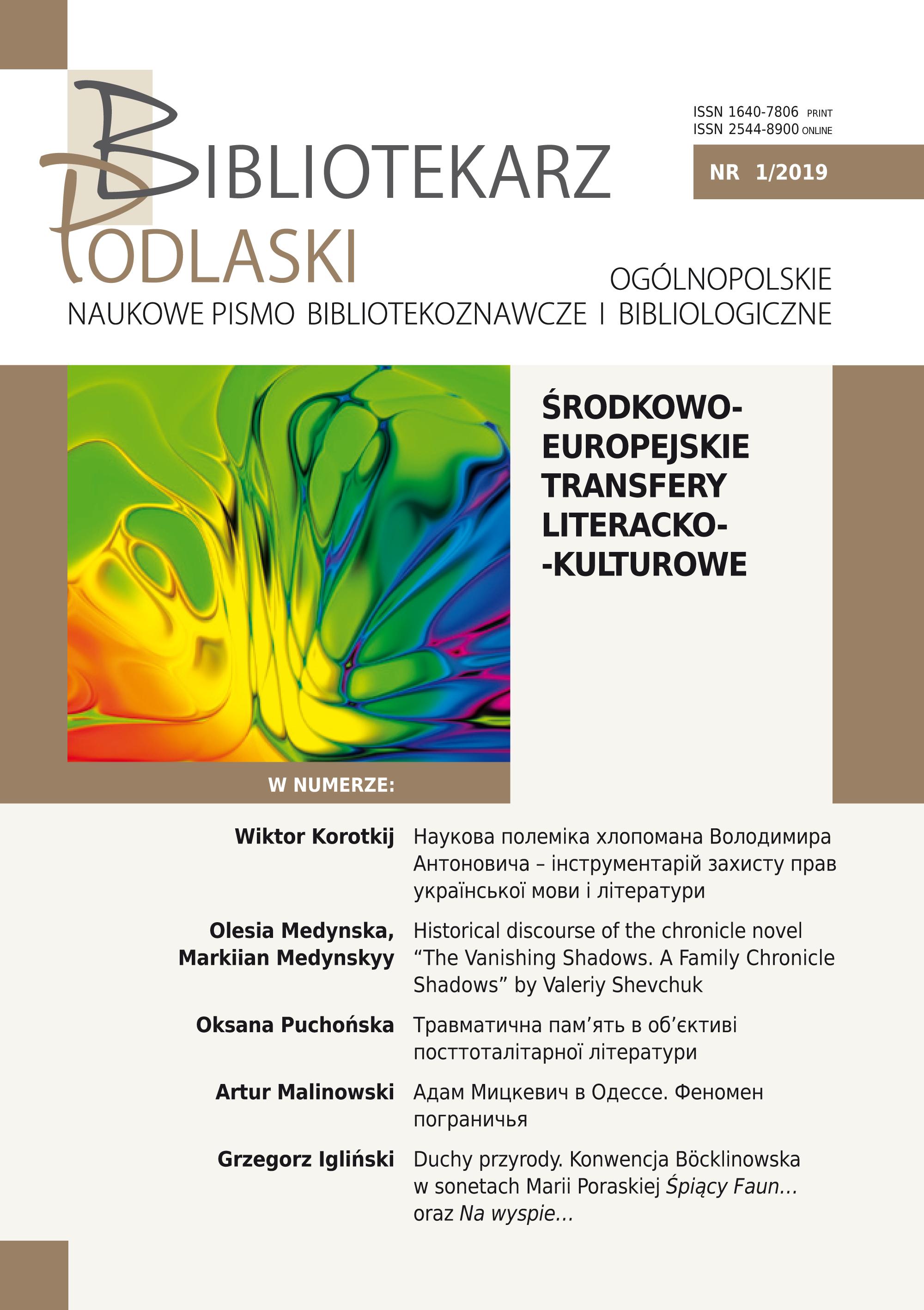Abstract
The theme of „Dostoevsky and Polish literature” has not been explored in literary studies yet, in particular from a contemporary comparative perspective. The present study unfolds the relationship between modernist Polish literature and the Russian writer᾽s works by focusing on Stanisław Przybyszewski᾽s literary heritage. The Polish writer was thoroughly familiar with Fyodor Dostoevsky᾽s main works, such as “Crime and Punishment”, “The Idiot” and “The Brothers Karamazov”. The binary relationship can be noticed between the novels “Dzieci Szatana” (eng. “Satan᾽s Children” and “Demons”, which reveal a number of common, artistic tendencies. Przybyszewski᾽s “Homo sapiens”, “Synowie ziemi” (eng. “Sons of the Earth”), “Mocny człowiek” (eng. “Strong Man”) and “Krzyk” (eng. “The Cry”) also share a number of parallels with the Russian writer’s works. In terms of aesthetic considerations, the universe of Dostoevsky’s and Przybyszewski’s novels contains a number of ‘interfering’ motifs, among which are the good and the evil, double, insanity, etc. Their novels display similarities in the creation of a hero, the concept of love and a variety of forms of psychologism.
References
Baranow Andriej, Kluczewyje katiegoriji komparatiwistiki i ich funkciji na primiere wosprijatija tworczestwa F. Dostojewskogo w Polsze, [w:] Srawnitielnoje litieraturowiedienije: tieoreticzeskij i istoriczeskij aspiekty, Moskwa: MGU, 2003, s. 208-214.
Baranow Andrzej, „Dzieje grzechu” S. Żeromskiego a literatura rosyjska, „Przegląd Humanistyczny” 1990, nr 1, s. 143-154.
Baranow Andrzej, Gra literacka jako element konstrukcyjny powieści Stanisława Przybyszewskiego „Dzieci szatana”, [w:] Gra z czytelnikiem. Między konwencją a strategią, pod red. Marii Jakitowicz i Rafała Moczkodana, Toruń: Uniwersytet Mikołaja Kopernika, 2001, s. 125-134.
Baranow Andrzej, Powieści współczesne Henryka Sienkiewicza w kontekście twórczości Fiodora Dostojewskiego, „Annales Academiae Paedagogicae Cracoviensis. Studia Historicolitteraria” 2002, z. 2, s. 127-140.
Baranow Andrzej, Rossica w późnej twórczości Elizy Orzeszkowej. Nieznany kontekst, „Litteraria Copernicana” 2018, nr 4, s. 221-229.
Boniecki Edward, Struktura „Nagiej duszy”. Studium o Stanisławie Przybyszewskim, Warszawa: IBL PAN, 1993.
Boy-Żeleński Tadeusz, Reflektorem w mrok, Warszawa: PIW, 1985.
Burek Tomasz, Przybyszewski-kusiciel, [w:] Stanisław Przybyszewski. W 50-lecie zgonu pisarza. Studia, pod red. Hanny Filipkowskiej, Wrocław: Ossolineum, 1982.
Dostojewskaja Anna, Wospominanija, Moskwa: Izdatielstwo „Prawda”, 1971.
Dostojewskij Fiodor, Piśma, t. 4, Moskwa: Goslitizdat, 1959.
Dostojewskij Fiodor, Połnoje sobranije soczinienij w 30 t., Leningrad: Nauka, 1972–1978.
Dynak Józef, Przybyszewski. Dzieje, legendy i autolegendy, Wrocław: Towarzystwo Przyjaciół Polonistyki Wrocławskiej, 1987.
Handke Ryszard, Arcydzieło w horyzoncie oczekiwań odbiorcy, „Ruch Literacki” 1975, nr 4, s. 254-263.
Irzykowski Karol, Pierwszy bilans Przybyszewskiego i jego rehabilitacja, „Wiadomości Literackie” 1926, nr 1.
Jauss Hans, Historia literatury jako wyzwanie rzucane nauce o literaturze, „Teksty” 1972, nr 4, s. 271-307.
Kulczycka-Saloni Janina, Dostojewski w Polsce, „Miesięcznik Literacki” 1972, nr 3.
Łosiew Aleksiej, Modernistskaja model, „Wiestnik Moskowskogo uniwiersitieta” 1996, ser. 9, nr 1.
Mackiewicz Stanisław, Dostojewski, Warszawa: PIW, 1957.
Matuszek Gabriela, „Der geniale Pole? Niemcy o Stanisławie Przybyszewskim (1892–1992), Kraków: „Universitas”, 1993.
Matuszek Gabriela, Stanisław Przybyszewski – pisarz nowoczesny. Eseje i proza – próba monografii, Kraków: „Universitas”, 2002.
Matuszek Gabriela, Współistnienie dwu poetyk: ekspresjonistycznej i modernistycznej w powieści „Krzyk” Przybyszewskiego, „Zeszyty Naukowe UJ. Prace Historycznoliterackie” 1981, z. 43, s. 83-101.
Moskwin Andriej, Stanisław Przybyszewski w kulturze rosyjskiej końca XIX – początku XX wieku, Warszawa: Wydawnictwo Uniwersytetu Warszawskiego, 2007.
Panajewa Awdotja, Wospominanija, Moskwa: Chudożestwiennaja litieratura, 1971.
Podraza-Kwiatkowska Maria, Somnambulicy, dekadenci, herosi, Kraków: Wydawnictwo Literackie, 1985.
Przybylski Ryszard, Stawrogin, „Teksty” 1972, nr 4.
Przybyszewski Stanisław, Dzieci szatana, Sandomierz: Amoryka, 2014.
Przybyszewski Stanisław, Moi współcześni. Wśród obcych, Warszawa: Biblioteka Polska, 1926.
Przybyszewski Stanisław, Na drogach duszy, Kraków: Drukarnia Narodowa w Krakowie, 1902.
Witt Wiwianna, Przybyszewski a Dostojewski (Jeszcze raz o „Biesach” i „Dzieciach szatana”), [w:] Stanisław Przybyszewski. W 50-lecie zgonu pisarza. Studia, pod red. Hanny Filipkowskiej, Wrocław: Ossolineum, 1982.
Articles published in the “gold open access” mode on the basis of a non-exclusive license agreement between the publisher and the author. Permitted use:
- the publication may be read and stored on any device,
- the publication may be cited (with obligatory reference to the author, the title of the text, as well as the full title, bibliographic address of the issue and page of the journal)
The editorial team of “Bibliotekarz Podlaski” implements an open access policy by publishing materials in the form of the so-called Gold Open Access. From volume 42 (issue 1/2019), the journal is available under the Creative Commons license (Attribution – ShareAlike: CC BY-SA).
The key declarations of the Open Access and Open Science movement, which we fully support, are available on the CEON Open Science website.
COPYRIGHT:
The editorial team of “Bibliotekarz Podlaski” implements an open access policy by publishing materials in the form of the so-called Gold Open Access. The journal is available under the Creative Commons license – Attribution – ShareAlike 4.0: International: CC BY-SA 4.0).
The key declarations of the Open Access and Open Science movement, which we fully support, are available on the CEON Open Science website.
“Bibliotekarz Podlaski” allows its readers to read, download, copy, distribute, print, search and link to the full content of articles. We enable full, immediate, unlimited (both in a territorial, temporal and technical sense) open access to all published content, in accordance with the principle that freely available research increases and accelerates the global development of science and the exchange of knowledge.
The editorial team of “Bibliotekarz Podlaski” encourages authors to place articles published in the journal in open repositories (after the review or the final version of the publisher), provided that a link to the journal’s website is provided.
The journal does not charge the authors any fees for accepting and publishing their texts.


